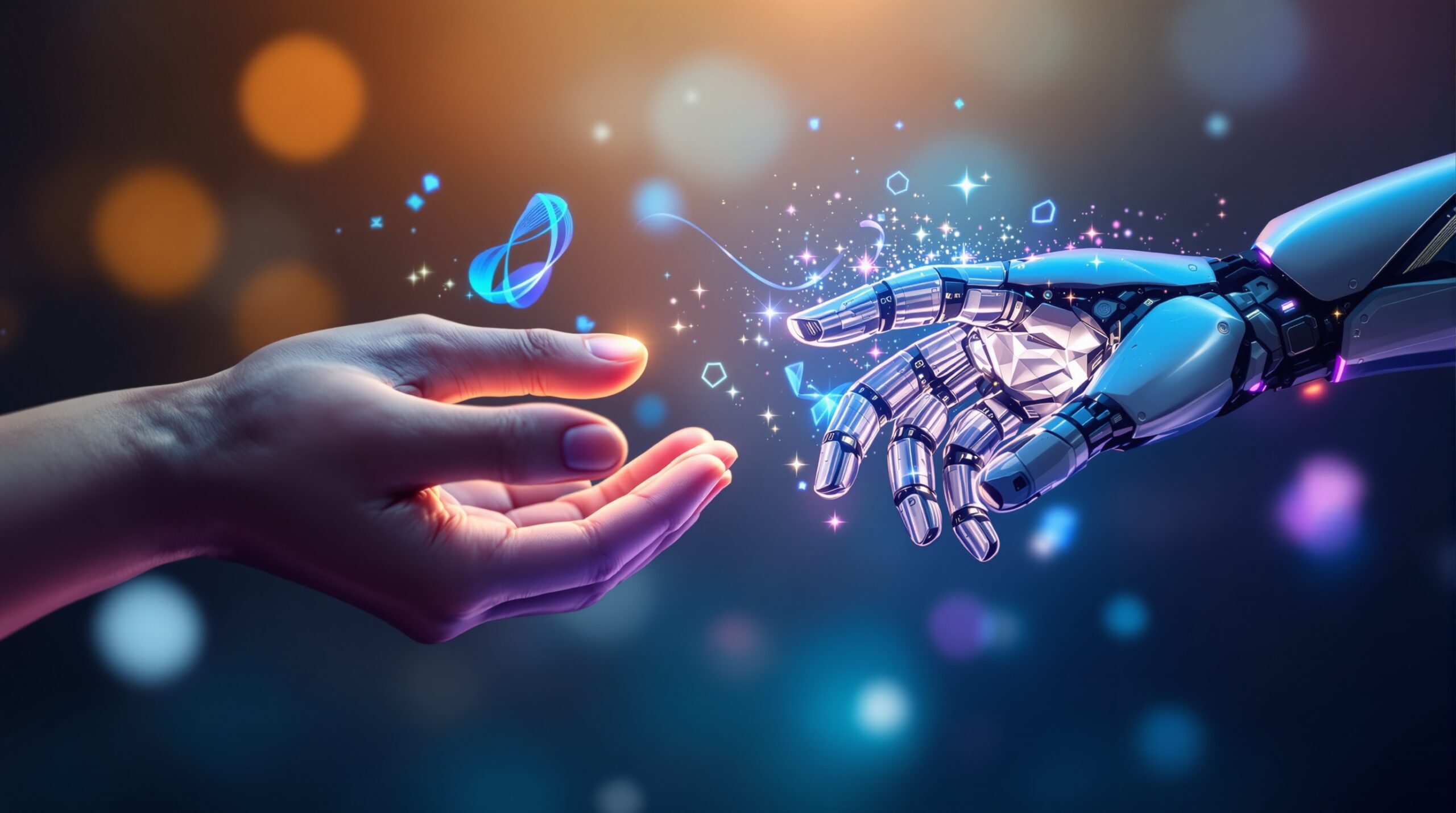Many professionals watch AI’s rapid advancement and wonder if their expertise still matters. Writers face this question with particular intensity: if algorithms can generate content in seconds, what role remains for human creativity? The question “will AI replace writers?” has evolved from existential threat to strategic opportunity, but only for those who understand the real transformation underway.
Will AI replace writers? No. AI is transforming rather than eliminating writing careers. While entry-level positions face disruption, writers who develop skills in AI supervision, content strategy, and creative direction are experiencing enhanced productivity and new opportunities in the 89,000 emerging roles focused on human-AI collaboration.
AI writing is not replacing writers but restructuring the profession. It’s not eliminating human creativity—it’s demanding new forms of it. While approximately 135,000 entry-level content writing positions have been eliminated or transformed, 89,000 new roles in AI content strategy and supervision have simultaneously emerged. This represents fundamental restructuring that rewards adaptation.
This article examines the evidence-based reality of AI’s impact on writing careers, revealing how writers can position themselves not as victims of automation but as orchestrators of human-AI collaboration. The path forward requires neither panic nor complacency, but clear-eyed assessment of what’s changing and what remains irreplaceable.
Quick Answer: Will AI replace writers? No. AI is transforming rather than eliminating writing careers. While entry-level positions face disruption, writers who develop skills in AI supervision, content strategy, and creative direction are experiencing enhanced productivity and new opportunities in the 89,000 emerging roles focused on human-AI collaboration.
Definition: AI writing transformation is the shift from AI-as-replacement to AI-as-tool, where human writers maintain strategic control while delegating initial drafts and routine tasks to algorithmic assistance.
Key Evidence: According to Siege Media and Wynter, 90% of content marketers plan to use AI to support content marketing efforts in 2025, up from 64.7% in 2023.
Context: This rapid adoption reflects AI’s role as collaborative tool rather than autonomous replacement, with human oversight determining success or failure.
The transformation works through a clear mechanism: AI handles initial content generation, reducing the cognitive load and time investment for first drafts. Human writers then provide strategic direction, creative refinement, and quality verification. This division of labor leverages each party’s strengths while maintaining human accountability for final output. The benefit compounds over time as writers develop fluency in supervising AI tools, allowing them to scale their expertise across more projects than manual creation alone would permit.
Key Takeaways
- Collaboration over replacement: The professional consensus shows AI functions as force multiplier requiring human oversight, not independent content creator.
- Job transformation creates winners and losers: 135,000 entry-level positions eliminated while 89,000 strategic roles emerged.
- Quality threshold breakthrough: Late 2023 marked AI’s crossing into consistently usable output without extensive editing.
- Strategic skills matter most: Human judgment, fact-checking, and creative direction remain irreplaceable regardless of AI capabilities.
- Adaptation determines outcomes: Writers developing AI supervision capabilities thrive while those resisting change face displacement.
How AI Is Changing Writing Careers
Maybe you’ve watched colleagues adopt AI tools and wondered whether you’re falling behind. Or perhaps you’ve tried AI writing assistants yourself and felt uncertain about where you fit in the process. These questions reflect a profession in genuine transition.
The narrative that AI will replace writers has largely given way to a different reality. AI is not writing independently. It’s acting as a force multiplier for human writers, handling first drafts and routine tasks while humans focus on strategy, voice refinement, factual validation, and creative direction. This pattern appears consistently across organizations that have successfully integrated AI into their workflows.
Current adoption data confirms this collaborative model. 71.7% of content marketers use AI for outlining, 68% for content ideation, and 57.4% for drafting content. These numbers reveal where AI adds genuine value: the initial stages of content creation that once consumed significant human time. Yet the most effective implementations maintain human control over strategic direction and final quality.
The impact varies significantly by career stage. Entry-level writers face the most severe disruption, with routine content generation roles either eliminated or transformed. The junior positions that once provided entry points into the profession have contracted sharply. Mid-career professionals who adapt find different outcomes. Those learning to supervise AI tools, validate output, and provide strategic direction often experience enhanced productivity rather than displacement. Senior writers and strategists see increased leverage, able to scale their expertise through AI assistance while focusing on high-value activities requiring judgment and creativity.
What enabled this rapid shift? According to research by Dr. Marcus Chen, AI researcher at MIT’s Computer Science and Artificial Intelligence Laboratory, late 2023 marked a turning point. Large language models crossed a quality threshold, generating text that’s consistently fit-for-purpose without extensive human editing, particularly in professional writing contexts. This breakthrough explains why adoption accelerated so suddenly.
Yet fit-for-purpose differs from finished. AI produces adequate first drafts for professional contexts, not polished work requiring no human refinement. This distinction determines whether implementations succeed or fail. Organizations treating AI output as final product face quality problems. Those treating it as raw material requiring human judgment achieve the productivity gains the technology promises.

The New Skills Writers Need to Stay Relevant
The 89,000 emerging roles in AI content strategy and supervision represent genuinely new competencies, not simply rebranded versions of existing jobs. These positions require hybrid skills combining traditional writing expertise with technical understanding of AI capabilities and limitations. This combination will likely define the profession’s future.
Strategic oversight has become foundational. Writers must now determine which content genuinely requires human judgment versus AI assistance. They establish clear human-AI workflows defining who reviews what and where accountability flows. They maintain brand voice consistency across AI-generated drafts. These responsibilities demand both writing skill and process design capability.
Technical AI literacy matters more than many writers initially recognize. Understanding AI capabilities and limitations allows realistic expectation-setting. Recognizing when AI output contains confident but false information protects quality and credibility. Selecting appropriate AI tools for specific content contexts requires familiarity with different systems’ strengths and weaknesses.
Enhanced verification abilities have shifted from nice-to-have to required. Rigorous fact-checking of all AI-generated claims now represents non-negotiable practice, particularly for statistics and technical details. Source validation and citation accuracy require human attention. Quality assessment distinguishing usable drafts from content requiring substantial rework depends on experienced judgment.
Creative direction and refinement remain distinctly human domains. You might notice that transforming adequate AI first drafts into compelling final content requires skills algorithms cannot replicate. Injecting genuine insight and authentic voice distinguishes memorable content from generic output. Making judgment calls about tone, nuance, and stakeholder needs draws on human experience and relational understanding.
Performance data from Siege Media and Wynter reveals that strategic implementation matters more than mere AI adoption. 62.8% of content marketers reported traffic growth year-over-year in 2025, while 36.4% reported decline. The difference lies not in whether organizations use AI but in how they use it. Human oversight quality and strategic decision-making about where AI adds genuine value versus where it undermines content integrity determine outcomes.
Practical Steps for Writers Working Alongside AI
A pattern that shows up often looks like this: a writer adopts AI tools enthusiastically, sees immediate productivity gains, then discovers three months later that their content has lost its distinctive voice. The algorithm’s efficiency came at the cost of what made their work worth reading. This happens when writers skip the strategic framework that makes AI collaboration work.
Effective workflows position AI as first mover with human oversight at both ends. AI handles ideation, outlining, and initial drafts. This reflects the adoption patterns showing 68% using AI for ideation and 71.7% for outlining. Yet humans provide strategic direction upfront: which content to create, target audience needs, key messages. Humans then conduct rigorous review afterward: fact-checking, voice refinement, creative enhancement.
Several safeguards prove necessary regardless of context. Non-negotiable fact verification tops the list. AI systems confidently present false information. Every factual claim requires independent human verification before publication, particularly statistics, quotes, and technical details. This step protects both accuracy and organizational credibility.
Maintaining appropriate oversight resists the temptation toward efficiency maximization. Short-term cost savings from eliminating human review rarely justify long-term reputation damage from errors, tone-deaf messaging, or homogenized voice. Trust, once lost, costs far more to rebuild than maintaining proper review processes.
Prioritizing value over volume requires ongoing discipline. AI enables unprecedented content production. Yet more content doesn’t automatically serve audiences better. Leaders must maintain discernment about what stakeholders genuinely need rather than publishing simply because AI makes it easy. This restraint often separates effective content strategies from ineffective ones.
Common mistakes reveal themselves through patterns. Organizations assume AI output is pre-fact-checked when it’s not. They eliminate human review to maximize efficiency, sacrificing quality for speed. They adopt AI because competitors are, not because it genuinely serves quality goals. They ignore the homogenization risk when multiple organizations use identical AI tools, producing indistinguishable content that fails to differentiate.
Clear division of labor leverages each party’s strengths. AI takes responsibility for scale and speed: generating multiple draft options, conducting background research, creating outline variations. Human authority covers strategy (which content and why), brand voice consistency, creative direction, fact verification, and stakeholder relationships. This framework allows both to contribute what they do best.
Performance data from Siege Media and Wynter shows AI-assisted blog writing tools increase organic traffic by 120% within six months in some contexts. Yet this benefit requires strategic human implementation, not automatic adoption. The technology enables results but doesn’t guarantee them.
What the Future Holds for Writing Careers
Near-term developments will likely intensify current trends rather than reverse them. According to Dr. Emily Zhao, Director of AI Publishing Research at Adobe, AI systems that adapt content in real-time based on performance data will reach mainstream adoption by late 2026. Early tests by major publishers are already underway. This capability will further shift human writers toward strategic oversight and real-time judgment rather than initial content creation.
The broader organizational context shapes how these tools get deployed. Research shows 79% of leaders expect generative AI to transform organizations within three years, with the majority prioritizing efficiency over innovation. This efficiency focus carries risks. Short-term thinking that prioritizes cost reduction may undermine the human expertise necessary to use AI tools effectively. Organizations discovering this too late will find rebuilding capability far more difficult than maintaining it.
Several challenges remain unresolved, creating uncertainty that honest assessment must acknowledge. Long-term talent development raises genuine concerns. Will elimination of entry-level positions create future talent shortages as fewer writers gain foundational experience? The profession has always relied on junior roles as training grounds. If those positions largely disappear, where do future senior writers develop their skills? The data remains insufficient for confident answers.
Ethical and legal frameworks continue developing, with current approaches lagging behind technological capabilities. University of Cambridge research found that 59% of UK published novelists report their work used to train AI systems without permission. These unresolved questions about fairness and creative ownership await regulatory frameworks that have yet to materialize. How societies address these issues will shape both the technology’s evolution and the profession’s future.
Content homogenization represents another growing risk. As more organizations use similar AI tools, the danger of producing indistinguishable output increases. Content that once provided competitive advantage through unique perspective and voice may become commoditized. Organizations recognizing this risk early and investing in distinctive human insight will maintain differentiation. Those treating all content as interchangeable will struggle.
The adaptation imperative grows clearer as patterns emerge. Writers embracing collaboration, developing AI supervision skills, and focusing on irreplaceable human capabilities position themselves for the profession’s evolution. Strategic judgment, creative insight, and authentic voice remain distinctly human contributions that algorithms cannot replicate. Those resisting change face increasingly limited opportunities in a transformed profession.
Why This Transformation Matters
The question of whether AI will replace writers touches something deeper than employment statistics. It asks what we value about human creativity and judgment. The evidence suggests we’re not losing writers but redefining what writing work looks like. That redefinition carries both promise and peril. Organizations that navigate it with integrity, maintaining space for genuine human contribution while leveraging AI’s capabilities, will likely produce better content and build stronger teams. Those treating it purely as cost reduction will discover that quality and trust erode faster than efficiency improves. The writers who thrive will be those who recognize that AI changes the tools but not the fundamental human need for clear thinking, authentic voice, and trustworthy communication.
Conclusion
Will AI replace writers? The evidence reveals a more nuanced reality. AI is transforming writing careers, not eliminating them. While 135,000 entry-level positions have been displaced, 89,000 strategic roles have emerged for writers who adapt. This transformation rewards those who view change as opportunity rather than threat.
The writers thriving in this transition view AI as collaborative tool requiring human oversight, not autonomous replacement. They’ve developed skills in strategic direction, quality verification, and creative refinement. These capabilities remain irreplaceable regardless of how sophisticated algorithms become.
You might find yourself standing at this crossroads, wondering which path to take. The evidence suggests that the path forward demands neither resistance nor uncritical embrace, but thoughtful integration that leverages AI’s strengths while preserving the distinctly human elements of judgment, creativity, and authentic voice that define writing worth reading. For those willing to adapt, the future holds not displacement but evolution into roles with greater strategic influence and creative impact.
Learn more about building effective human-AI collaboration frameworks, explore AI writing ethics considerations, or compare AI versus human writing capabilities in different contexts.
Frequently Asked Questions
Will AI replace writers?
No. AI is transforming rather than eliminating writing careers. While 135,000 entry-level positions have been displaced, 89,000 strategic roles in AI supervision and content strategy have emerged for writers who adapt to human-AI collaboration.
What new skills do writers need to work with AI?
Writers need strategic oversight abilities, technical AI literacy, enhanced verification skills, and creative direction capabilities. These hybrid competencies combine traditional writing expertise with understanding of AI capabilities and limitations.
How is AI changing entry-level writing jobs?
Entry-level writing positions face the most severe disruption, with routine content generation roles either eliminated or transformed. Junior positions that once provided entry points into the profession have contracted sharply as AI handles initial drafts.
What does AI supervision in writing mean?
AI supervision involves human writers maintaining strategic control while delegating initial drafts to AI. Writers provide upfront direction, conduct rigorous fact-checking, refine voice and creativity, and ensure quality standards are met.
When did AI writing become consistently usable?
Late 2023 marked the turning point when large language models crossed a quality threshold, generating consistently fit-for-purpose text without extensive human editing, particularly in professional writing contexts.
What percentage of content marketers use AI for writing?
According to Siege Media research, 90% of content marketers plan to use AI for content marketing in 2025, up from 64.7% in 2023. Currently, 71.7% use AI for outlining and 68% for content ideation.
Sources
- Yomu AI – Comprehensive analysis of AI writing adoption trends, market data, expert perspectives, and job market transformation through 2025
- Siege Media – Content marketing statistics on AI adoption rates, usage patterns, traffic impacts, and industry projections
- University of Cambridge – Research on novelist perspectives regarding AI displacement concerns and unauthorized training data usage


